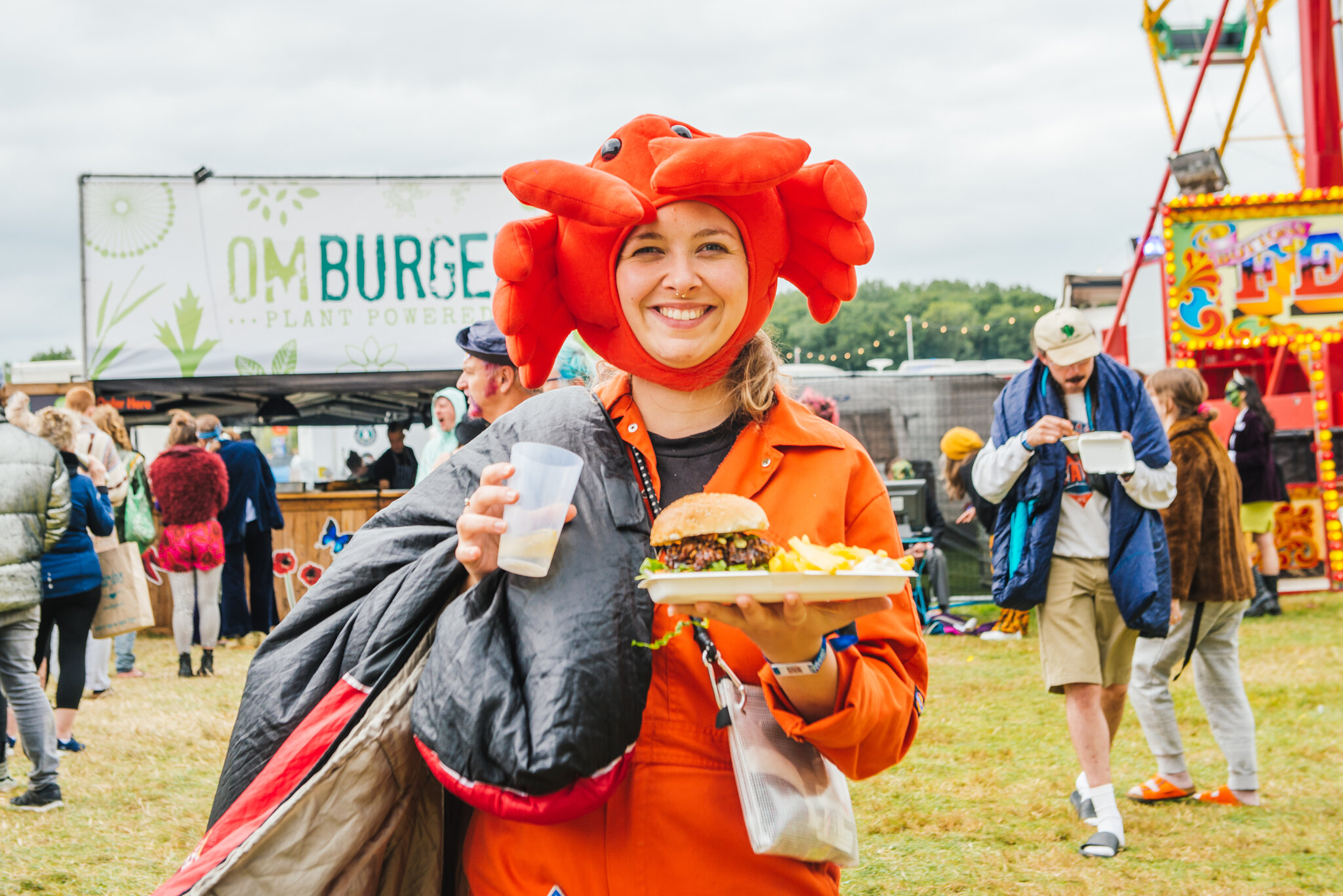In 2016, we made the decision to remove meat and fish from our on-site food offering, for both the public and our festival staff.
For us, the decision was an environmental one. If we’re serious about being the most sustainable festival on the planet, we can’t ignore the indisputable evidence that a diet predominantly based on meat and fish is having a devastating effect on this little blue and green marble we call home. The estimated impact of going plant-based is a massive 100 tonnes of greenhouse gas emissions per year!
This was our most controversial, and risky environmental initiative to date – would it drastically affect ticket sales? Would we be regaling future generations about the great Shambala Bacon Riots?
Well, we needn’t have worried….
After one year of being a veggie utopia, 77% of Shambalan survey respondents voted to keep Shambala meat and fish free. The following year, that figure rose to 94% – which was beyond our wildest imaginings!
Even more incredible was that 33% of you reporting reducing your meat and fish intake since the festival (that’s not counting the 30% of you that were already veggie or vegan).
So.. What Does This Mean for the Future?
We feel we’ve only just begun to explore the complex issues around sustainable food. We’re committed to continuing the debate. So, whilst the food traders on site will absolutely remain vegetarian or vegan, we are always keen to further debate around the supposed sustainable meat/protein sources of the future – in 2016 we had the Insect Cafe, and in 2017 we hosted a workshop exploring the ethics behind eating the invasive species that have pushed some of our native wildlife to the brink of extinction. In 2018 we hosted a big debate about the future of sustainable meat at Shambala, where the overwhelming outcome of votes cast sided with remaining Meat & Fish Free.
Why Did We Decide to do This in the First Place?
We’re not pretending to have all the answers, but we do want to spark debate and get people talking about what we eat and how it impacts our environment. Everybody’s opinions are truly welcome and there are no wrong answers, so join the conversation and make your voice heard (and please respect other people’s!)
At Shambala, we have always endeavoured to find ways to reduce the environmental impact of our festival. Over our twenty-odd year history, we’ve ditched disposable plastics, introduced sustainable travel initiatives and become 100% renewably powered. But when it comes to the next step in our quest, to combine the best party with an absolute commitment to the future, we can’t help but feeling there is a big, meaty elephant in the room.
Consumption of meat is a significant cause of environmental damage; as well as land degradation, deforestation and ocean pollution, the meat industry is responsible for more greenhouse emissions than the combined exhaust fumes from all global transportation. It’s also becoming more widely accepted that is unhealthy to consume meat in the way that we are.
So, we set ourselves a challenge: to provide the most eye-popping, mouthwatering, colourful, hearty array of festival cuisine imaginable, without a single bit of meat or fish on sale. Not a sausage. Our food traders well and truly stepped up to the plate, and our brand new foodie venue, The Garden O’ Feeden played host to luxury dining experiences, debates, talks and creative exploration of the wonderful world of food.
Shambala HQ is a mixed bag, with vegans, veggies and meat eaters co-existing harmoniously together, but the whole team agrees that it is important to be bold with our environmental stance, and encourage this debate.
Meat lovers, you can choose to bring your own meat onsite if you wish. But with an amazing range of tasty, colourful and hearty veggie options on offer from our café’s, we hope you will be surprised not to miss meat for four days.
Meat & Fish Free FAQ
Why not promote this debate, and let the audience make their own choices on site?
That’s a fair question. We have a twenty-odd year history of throwing a truly epic party, but we also have a long established history of being pioneering with our environmental stance and initiatives. As a team and an organisation we felt it was important to make this choice, and that a bold stance is the most effective way to get a debate going. However, festivalgoers have the choice to bring their own meat (we really hope its local, ethical and organic etc), the choice to eat whatever they choose in life generally, and the choice whether to come the Shambala for four days in the first place.
I want to know where my food is coming from, whether meat or not.
Us too. We already have a strict food sourcing policy for all providers onsite, which includes local, regional and certification guidelines, e.g. organic products. We also work with vetted local wholesalers to supply to our cafe’s. As part of our minimum standards for cafe’s, and the Green Traders Award, our green team check that everything is as it should be onsite, and we support food providers pre-event. In 2016 as part the meat-free decision, we will be working event more closely with cafe’s to ensure we have an ever-increasing awareness of food provenance. As we take steps on this journey, engage in the debate, and learn more ourselves, we hope to be able to delve further into the issues, and develop creative solutions, for example food trails onsite, maps showing where what we are eating is coming from, and the door is still open to meat and fish in future if we can come to a point where we truly believe we can offer this is a sustainable way.
With regard meat specifically, we have found it difficult to navigate the plethora of food certifications, and difficult to have complete confidence in our own meat supply chain, even assisting the Food Standards Agency with the prosecution of a trader for alleged food fraud in 2014 – actively working together to identify misleadingly presented products in the supply chain. We know we do much more than most festivals with food standards and provenance, and we work with amazing festival cafe’s who share our commitment to ethics, but even so, with the exception of specific known local sources (which we use for all of our crew catering), we have found it almost impossible to be 100% sure about the provenance of all the meat onsite. Food fraud – mislabelled food – accounts for about 10% of all food sold in the UK, according to the Food Standards Agency in a recent BBC program, and we know that particularly in the fast-paced world of events provenance is an issue, especially with regards meat.
How does this decision affect choice on site and value?
We are working alongside our traders to provide a genuinely exciting and diverse menu. It’s worth noting that about 70% of our food offering on site was meat free prior to this decision anyway. We also continue to work on improving value for money and affordability – essentially, meat is more expensive. Its a challenge, and sometimes there’s more preparation involved in more interesting menu options, but we will work hard with our cafes to move in this direction.
Where can we find out more about the impacts of agribusiness?
We have found a few sources, which we think are worth watching or reading, which you can make your own mind up about. Over the year, we will be exploring the many specific issues relating to food, and working with various existing projects and partners to explore more sustainable approaches. As we go, we will share many more sources between us, so please share!
Cowspiracy
Five Things Would Happen If Everyone Stopped Eating Meat (Independent Article, Feb 2016)
Ed Gillespie ‘You are what you eat’ TEDx
George Monbiot’s Guardian blog
WRAP Resource Map
People, Plate, Planet Report (2014) – part of the Zero Carbon Britain project, Centre for Alternative Technology
If farming/agriculture is the problem – why ban fish too?
With three quarters of the world’s fisheries exploited or depleted, the current model for fishing sadly is clearly no longer sustainable. For every pound of fish caught by large scale operations, up to five pounds of unintended species are caught too, and then discarded as by-kill. However, we fully accept that there are sustainable ways to fish, and we will be exploring this over the year and at the festival.
Can we bring meat to the festival?
Yes. It is not our intention to dictate what you bring to the festival (within reason!). But it is our intention to make decisions that ensure that our Adventures in Utopia have as little negative environmental impact as possible – not selling meat or fish onsite is a natural next step on this journey. We sincerely hope that if you do bring meat, it is local, ethical and does not support the industrialised systems we are taking a stand against. But that’s your choice.
I am gluten/wheat/dairy free – will there be enough options for me?
We absolutely understand that some of our Shambalans will have different dietary requirements and are working very closely with our traders to ensure that there’s a fantastic array of options to keep all your tummies full. Our food offering this year is set to be more diverse, creative and exciting than ever – so whether you’re gluten/wheat free or just think dairy is scary, we’ll have you covered. We will publish information in advance on the website.
I need protein in my diet to fuel me through the party and vegetarian food won’t cut it!
We are well aware that three days of non stop fun, adventure and discovery demands some serious fuel and we will make absolutely sure that the diverse and delicious meat-free fare on offer will more than keep you going. Most nutritionists and dieticians agree that we only need between 2.5 and 10% of our calories from protein and ALL vegetables offer us more than that – not to mention the veggie protein heavyweights: beans, lentils, brown and wild rice etc. Aside from vegetables, we’ll have plenty of food choices packed with cheese, dairy and eggs, all of which are a fantastic source of protein. And it’s only four days!
How reliable are the figure about the impact of meat on green house gasses?
The figures available about the global green house gas emissions resulting from the meat industry vary from 14% to 50% of global GHG’s. Even at the lowest estimates, its more than all transport emissions combined. And there is overwhelming and undeniable evidence that meat production plays a significant role in diverse environmental issues – land degradation, deforestation, ocean pollution – due to being a highly resource intensive and inefficient process. If you are considering water usage specifically, availability will vary across countries and regions, so the impacts will vary.
Is the UK going to produce different states based on a wetter climate, especially for water consumption where there may not be the need for so much irrigation for livestock crops?
If the UK did produce its own statistics, we’d certainly be interested to see them, although to be honest we don’t know if it matters all that much. This is a global issue and cutting our meat intake (regardless of which country we live in) is an amazing example of how every one of us can make a small change which can have a huge impact on the ecological systems which support us and the quality of life of generations to come.
Will Shambala demonstrate the reduction in carbon impact from food?
It’s impossible to be exact about this for a single event – we’d have to compare what meat you might have consumed at home and/or the amount of meat we sold onsite the previous year and compare, but we don’t have this information. However, we are beyond confident that by not consuming meat or fish at the event, we will make a valuable and significant contribution to reducing the impacts of the festival, and encourage an important conversation to take place. Meat free diets are considered to create 50% less emissions. And we will share some information about the relative differences in impacts between meat and meat-free diets as we explore the topic through the year.
What about crew food?
We can’t believe you even asked us this – of course ALL of the food we provide for staff and crew is 100% meat and fish free, mostly local and mostly organic.
Why not just have local, small-scale farmed meat?
Yes, locally sourced, ethically produced and/or organic meat has significant benefits compared to meat produced on an industrial scale, and transported long distances. For example, travel related emissions, animal welfare, impact on local ecology and quality of the produce. In previous years we have championed local and ethical meat producers – in fact it’s been a stipulation for all caterers onsite, and we have traced sources we use directly to try to be confident about this, and set minimum standards for other for providers.
It may well be possible in the UK that if everyone consumed much less meat, from local and ethical sources, that it could be sustainable in the long-term as part of a considered low carbon diet. The People Plate Planet Report produced by the Zero Carbon Britain Project, for example, suggests a low carbon diet which could be sustainable in the UK, but only based on a national scenario put forward which includes some chicken, dairy and pig. But this is not something we can be sure about in the current context. One thing we are sure about, is that with such critical levels of Green House Gasses globally, that everything possible has to be done to reduce emissions. Meat is highly resources intensive (whether organic, local or whatever), and results in significant emissions compared to meat free diets.
Isn’t the carbon footprint of airfreighting tofu or soy worse than locally sourced meat?
We don’t want to get caught up on focusing on individual items. The research available clearly demonstrates that overall, a meat-free diet has about half the carbon impact of a meat diet, and a dairy-free vegan diet has a third of the impact. Sure every type of food will vary in its impacts, but let’s see the wood for the trees. However we do absolutely encourage local, regional, seasonal and sustainable sourcing for all of our food provides onsite, and our ability to fine tune this in terms of certain products will increase year on year as our efforts result in more learning. We like to think that perhaps in future, when you buy any food product, there will be a traffic light system for carbon intensity, or environmental impacts more generally, but we’re not even close to that as a society.
Organic farming uses more fuel and land than non-organic, how can we feed the world if we all went organic?
We agree that organic farming isn’t the answer to the global problem, as it uses more land than other farming techniques, and does not address the fundamental resource-intensity of consuming meat. But for local ecology, animal welfare, health and provenance, it’s a big step in the right direction for what we do choose to consume. There are many other issues that affect food poverty including food waste, soil degradation, poverty, inequity of power, and distribution – issues that we hope we will explore on site with our exciting food offerings, installations and venues. A recent TEDx talk we found suggests that there’s enough capacity with current agricultural land to feel a further 1.5 billion people, if we did not consume meat.
If everyone stops eating meat you will put UK farmers out of business. Is that really utopia?
We’re certainly not trying to tell everyone they should become vegan overnight. We are simply not serving meat for 4 days at the festival to reduce the festival’s impacts, take a stance, and to encourage an important debate.
There is already lots of discussion going on in society around eating less meat, such as the Meat-Free Monday movement and flexitarianism. We’ll be bringing these discussions with us to the festival site, alongside views on eating bugs, roadkill and locally sourced meat.
Millions of farmers in mostly developing nations can no longer survive on their land due to the changes being experienced as a result of climate change. In the UK, climate change is already affecting yields and challenging farmers to adapt to changing temperatures. It’s likely that the whole of society is going to have to rethink the way we do things to secure a positive future, including farmers. 70% of UK land is used for agriculture, and yet the UK imports over 40% of the food consumed. If we can free land up from animal grazing and their feedstocks, we can use the land to support more diverse foods for our population, and reduce imports. It’s also the case that many farming practices in the UK are a disaster for the ecosystem – changes need to happen for this reason, regardless of climate change. Save the bees! This is simplistic we know, as there is land which is only suitable for grazing etc etc, but even here, there are detrimental ecological impacts and forest could act as carbon sinks – read George Monbiot’s Feral for more on this topic.
Isn’t it the case that if we all eat much less meat, from ethical and sustainable sources, it’d be okay?
From the studies and material currently available it is clear that the current food system is not sustainable. How this can be addressed and the decisions we all choose to make in our daily lives is part of the debate we intend to have leading up to the festival and onsite. We have many friends of the festival who champion local and sustainable ways of doing things, and we will create space in the debate for their voices. There are scenario’s put forward for low carbon diets, which include small amounts of sustainably produced meats (chicken and pig), and dairy, but its starts to get complicated in terms of what we do, and how we present this.
What about all the soya and other foods air-freighted which are consumed in vegan diets?
[Excerpt from article in the independent, February 2015] “Yes, your beef or pork may be locally grown, but what about the animals’ feed? Vegetarians and vegans aren’t gobbling up all the grains and soybeans – cattle are. A staggering 97 per cent of the world’s soya crop is fed to livestock.
It would take 40 million tons of food to eliminate the most extreme cases of world hunger, yet nearly 20 times that amount of grain is fed to farmed animals every year in order to produce meat. In a world where an estimated 850 million people do not have enough to eat, it is criminally wasteful to feed perfectly edible food to animals on farms in order to produce a burger rather than feeding it directly to people…”
———————
Love, the Shambala team x






